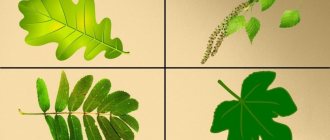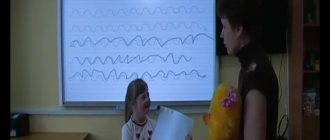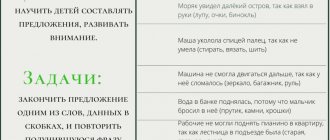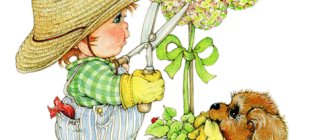Speech therapy project “Journey to the world of dishes”
Relevance of the problem:
It is known that the basis of human speech organization is the lexicon, the shortcomings of which significantly complicate the process of social adaptation. Features of the intellectual and speech development of students with 3P limit the ability of these children to understand the speech of others, adequately express their own thoughts and lead to inferior social and everyday orientation. Consequently, one of the current areas of work with children with mental retardation should be the formation and development of vocabulary. Poverty and undifferentiated meanings of words lead to a violation of the norms of word usage and the ways words function as part of a sentence and a coherent utterance. This significantly limits children’s ability to independently understand the world around them and complicates the process of learning about the world around them. The uniqueness of vocabulary and speech understanding in children with mental retardation is associated with their intellectual and emotional immaturity, and with reduced cognitive activity. It is these features that determine the limited, inaccurate, and sometimes erroneous knowledge and ideas of children about the world around them.
However, the system for the formation and development of vocabulary in children with mental retardation in speech therapy classes is currently not sufficiently developed. This, in turn, does not allow us to formulate scientifically based methodological provisions for correctional work. Because of this, consideration of the proposed problem is timely and relevant.
The relevance of this topic is also the fact that in our modernized times, the family, as one of the most important structures in the development of a child, does not justify itself. Many parents either simply do not understand the essence of the problem - these are the so-called pedagogically neglected parents; or parents who are busy obtaining funds for a full-fledged living, or these families are socially unstable. All these factors are not in favor of the child, especially those with mental retardation. But this gives a huge field of activity to a professional in his field, a person who not only does his job, but also cares for every child with his soul. In this regard, it remains an urgent problem for a speech therapist to find effective technologies for teaching children with mental retardation, an integrated approach to the correction and formation of cognitive interests, the accumulation of diverse knowledge about the world around them and the use of this knowledge in practical activities.
Target:
Reveal children's knowledge about dishes. Develop children's cognitive and creative activity.
Tasks:
Develop abilities for search activities: Define a task based on the problem posed.
Plan the stages of your activities in accordance with the task.
Choose materials and methods of action.
Be able to justify your choice.
Clarify and generalize children's knowledge about dishes.
Develop the ability to conduct dialogue. Develop collective mental activity.
Foster the need for care and respect for dishes.
Forms of work: group, individual
Project duration: Short term.
Project type: information and research.
Project participants:
- Older children
- Grandma Fedora doll
- speech therapist
- parents
- other participants (grandparents)
Expected result:
We will find out:
What are utensils for?
What types of tableware are there (types: tea, table, kitchen).
What parts does the cookware consist of?
How and why dishes appeared.
Materials from which dishes are made (wood, iron, plastic).
How to handle and care for dishes.
We will increase our vocabulary:
tureen, sugar bowl, butter dish, pepper shaker, salt shaker, lid, handle, spout, walls, bottom, edges. We activate the words: dining room, kitchen, tea, brewing, large, small, dessert, deep, shallow, metal, porcelain, crystal, glass, ceramic, wooden; fragile, transparent, clean, strong, cook, pour, boil, fry, stew, bake, boil, brew, wash, wipe, store, clean, take care….
We will produce:
Book-brochure “There are different types of dishes.” The pages of this book are made by children together with their parents. In the future, it can be used in speech games with children in the classroom (stories, illustrations, proverbs, nursery rhymes, sayings, riddles).
Project implementation stages
| Project implementation stage | Activities of a speech therapist | Activities of children and parents |
| Stage I – Preparatory | Conversation:
| Invite parents to take a tour of the store to the “Cookware” department |
| Stage II – Planning | We create a sequence of actions together with the children:
We discuss together what the book will be like (appearance, what it will contain, the size of the book). We discuss who will do what: who will find out the types of dishes, the origin of the dishes, what the dishes are made of; who will bring photographs of dishes, who will find riddles, proverbs about dishes. | We ask parents to help us find answers to the questions we have. |
| Stage III – Collection and synthesis of information | Every day one of the children tells what he learned about, what information he collected. Experimenting with dishes
Preparing the product for presentation: Sorting stories, illustrations, drawings. Compiling and distributing short stories into a book based on guiding questions. | Invite parents to choose proverbs, riddles, poems, and illustrations about dishes. Each parent is given a specific task. Children, with the help of a speech therapist, tell their parents about the news every day. |
| Stage IV – Presentation of the project product | Show the book and everyone who participated in the project will tell other children what they learned about dishes. | Make a slide show, or present the book itself at a parent meeting. |
Analysis
The project has developed all types of direct educational activities: communicative, cognitive-research, gaming, reading fiction, productive (drawing), socialization. The project was developed for one week.
Children consolidated and enriched their ideas about the colors and shades of the utensils around us. New colors and shades were added to the already known colors and shades (brown, orange, light green). They developed the ability to paint over a drawing with a pencil, drawing lines and strokes in only one direction (top to bottom or left to right); rhythmically apply strokes throughout the entire form, without going beyond the contour.
Working with children on the project, the children traveled in time and space (mentally visited the caves of primitive people who did not know about dishes and ate raw food), and took part in experimental activities.





